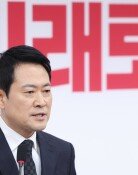Study Ranks Family Corporate Control
Study Ranks Family Corporate Control
Posted February. 07, 2006 04:10,
A study ranked the SK Groups level of family corporate control the lowest among Koreas top 29 conglomerates, followed by Doosan, Hanwha and Hyundai Heavy Industries.
The study gave Hyundai Development Company the strongest family corporate control ranking, followed by KCC, Shinsegae, Hyosung and Daesang.
Chang Deok-jin, a professor of sociology, and Park Cheon-wung, a researcher at Seoul National University, analyzed the changes in the ownership structures of 29 conglomerates in the country from 1997, when the Korean financial crisis hit, to late 2003 to create the study.
Professor Chang team measured corporate family control in numbers.
On a scale of zero to one, the closer the number gets to one, the more shares of its affiliates with higher company value a conglomerate owns.
The number will climb even when a company secures stakes directly, not through its affiliate.
The team generated numbers for Koreas largest 29 conglomerates.
SK Group was found to have the weakest family corporate control number, 0.053. The Hyundai Development Company has the strongest with a number of 0.888.
Samsung Group, at 0.159, is way below the average 0.377 of 29 conglomerates, and is classified as a group that has weak family ownership control.
When compared to the top 23 conglomerates in 1997, when the economic crisis struck the country, family corporate control power has weakened substantially since then.
In the process of overcoming the financial crisis, the governments ownership regulations and inheritance proceedings led to the breakup of conglomerate stakes, said Chang. I cannot simply value this as either positive or negative, but I can say that the power of companies to fight against the huge inflow of foreign capital has weakened.
.
Professor Kim Jin-bang of Inha University pointed out that it is true that the level of family corporate control has decreased compared to the past, and that because ownership families are exerting excessive leverage relative to their stakes, authorities and minority shareholders need to continuously keep them in check.
Changs report: Korean Chaebols: Changes in Investment Networks, 1997-2003 was released The Possibility for Chaebols to Sustain Themselves in Korea and Japan symposium held in Japan late last year.
Se-Jin Jung Kwang-Hyun Kim mint4a@donga.com kkh@donga.com




![[속보]이스라엘 “이란 공격” 국가비상사태 선포…테헤란 폭발음](https://dimg.donga.com/c/138/175/90/1/wps/NEWS/IMAGE/2026/02/28/133440981.1.gif)


